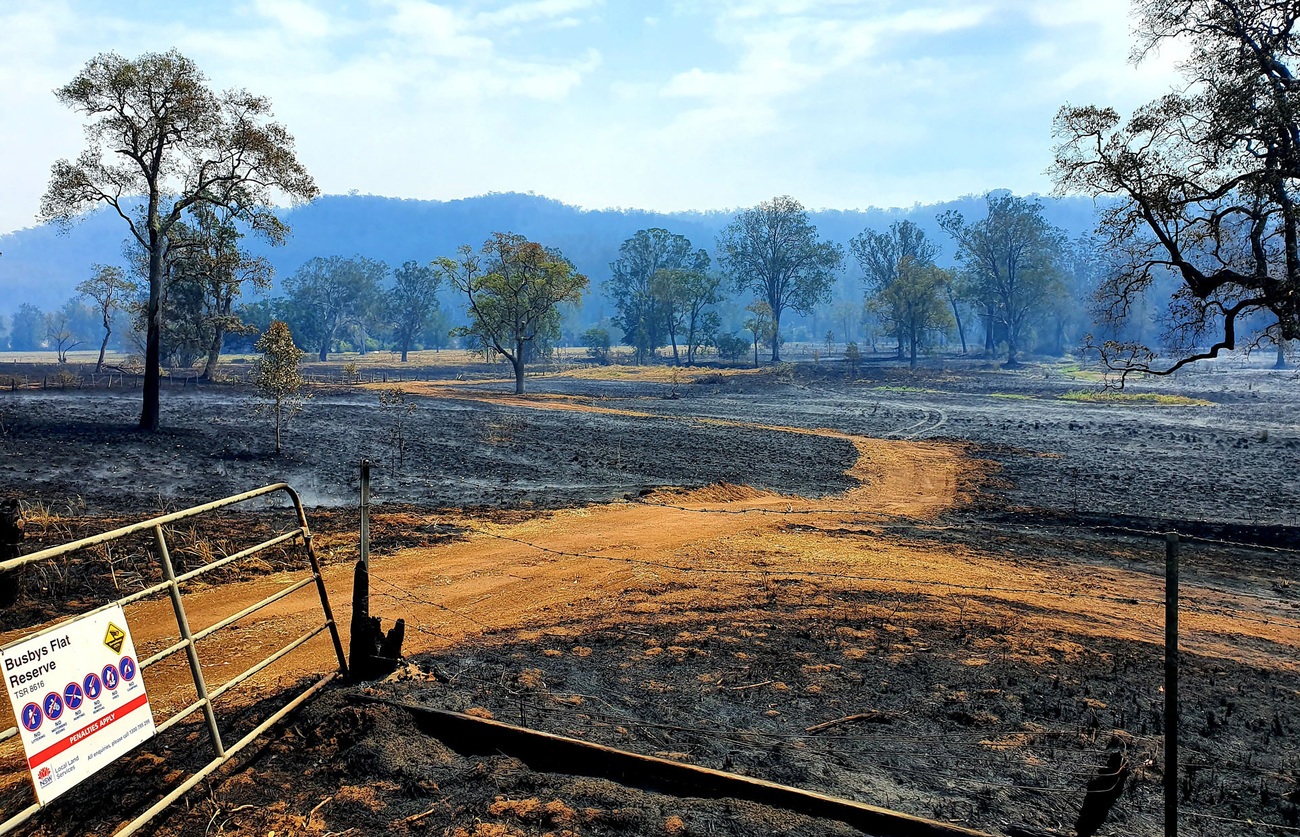Koala Protection: Rescue, Rehabilitate, Release, and Secure - Australia, New South Wales
Planting a future for koalas, one tree at a timebushfire recovery reconnects habitat, helps endangered species
bushfire recovery reconnects habitat, helps endangered species

Sydney, 26 April 2023 – Koalas and greater gliders are two of more than a dozen species benefiting from the reconnection of thousands of hectares of Australian habitat impacted by the Black Summer bushfires.
IFAW and the Great Eastern Ranges (GER) combined forces over a 15-month period to assess the impact of the 2019-20 Black Summer bushfires and undertake recovery projects to help communities, wildlife and landscapes heal. This effort involved 28 local groups, 450 individuals and 3,500 hours' worth of volunteer help.
“The scale of impact from the Black Summer bushfires was unprecedented. We have seen firsthand the trauma of local communities and the destruction of native species and the places we all call home,” IFAW Regional Director Rebecca Keeble said.
“Australia is at a crossroads—we are seeing the impacts of climate change at an alarming rate. We need to look beyond recovery to building resilience for our communities, wildlife, and landscapes which have been on the front line of these climate disasters.”
Recovery projects included tree planting, weed management, nest box installation, citizen science surveys, community education and capacity building.
At least 15 endangered species benefitted from these projects including the koala, greater glider, red goshawk, spotted-tail quoll and the black-breasted button-quail which is critically endangered in New South Wales (NSW).
The regional connectivity between core patches of habitat was also improved across 228,137 hectares of land in NSW and Queensland in the Lockyer Valley, Border Ranges and Blue Mountains. This includes bushfire-impacted land and land that, while not directly impacted, was identified as providing important habitat refugia for wildlife.
Native habitats were also increased through planting and assisted natural regeneration with more than 23,000 plants established.
“The Black Summer bushfires resulted in significant damage for people and nature over vast areas,” said Gary Howling, CEO of Great Eastern Ranges.
“There was an urgent need for evidence-based and complementary bushfire recovery projects to be rolled out to restore and reconnect vital habitat, assist wildlife and build community and landscape resilience to future climate disasters. Our partnership with IFAW enabled us to work with our regional partners to deliver a suite of these community-led activities in three badly impacted landscapes in NSW and QLD.”
IFAW and GER undertook these projects between 2021 and 2022 with local landholders, Indigenous leaders, and community groups. Similar recovery projects are underway following the 2022 flood disaster.
ENDS
Notes:
- This project was a collaboration with 28 local groups including GER regional partners Kanangra-Boyd to Wyangala Link Inc, Northern Rivers Fire & Biodiversity Consortium, Healthy Land and Water Ltd, Lockyer Upland Catchments Initiative, Griffith University and the Community Environment Network.
- Connectivity is the degree to which landscapes and seascapes allow species to move freely and environmental processes, like soil formation, to function as they should. It is crucial for the survival and adaptability of people and animals, particularly in the face of climate change.
- A metric was used to calculate the improved connectivity of landscapes at the local level. It applies what is known about a certain species’ movements, identifies those features in landscapes and the natural pathways which would improve movements. This is followed by the quantifying of works completed at anchor properties within these landscapes which contribute to connectivity. The figure calculates the size of the new wildlife corridors created plus the habitat patches it has connected.
Press Contacts
IFAW Australia
Dominica Mack
m: +61 (0)460 432 901
e: dmack@ifaw.org
GER
Gary Howling
m: +61 (0)428 852 814
e: gary@ger.org.au
About IFAW (International Fund for Animal Welfare) - IFAW is a global non-profit helping animal and people thrive together. We are experts and everyday people, working across seas, oceans and in more than 40 countries around the world. We rescue, rehabilitate and release animals, and we restore and protect their natural habitats. The problems we’re up against are urgent and complicated. To solve them, we match fresh thinking with bold action. We partner with local communities, governments, non-governmental organisations and businesses. Together, we pioneer new and innovative ways to help all species flourish. See how at ifaw.org
About the Great Eastern Ranges (GER) – Since 2007, the Great Eastern Ranges has brought people together to stem the loss of native wildlife and their habitats, provide natural solutions to the climate crisis, protect precious resources, and ensure thriving, resilient landscapes and ecosystems for nature and people. Today, we are one of the world’s largest conservation initiatives, delivering environmental, health, cultural and socio-economic benefits across eastern Australia through our extensive network of local, regional, and national partners.
Related content
Our work can’t get done without you. Please give what you can to help animals thrive.